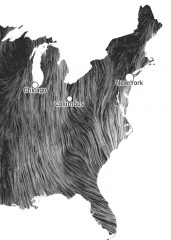As of noon, the mayor has ordered an evacuation for residents in the most vulnerable areas of the city, ‘Zone A.’ [Because of demand, this embedded map may be slow to load.] More info below map inset.
The subways shut down at 7 PM tonight, with likely service restoration beginning on Wednesday. As noted by the MTA’s director of sustainability, Projjal Dutta, increased storm surges in recent years have made the underground transit system more vulnerable. Because of the size of the storm, combined with a full moon tide on Monday night, the surge from Hurricane Sandy is expected to surpass that from Irene last year. Predictions are from 6′ to 11′ in NYC; the higher estimate would certainly overflow seawalls in lower Manhattan, and could reach subway street grates and entrances.
More links and notes:
 Here’s an interactive wind map of the U.S., built from National Weather Service data.
Here’s an interactive wind map of the U.S., built from National Weather Service data.
Warmer oceans and a shifting jet stream, both artifacts of climate change, are an influence on the size of storms reaching the East Coast, yet climate change is not a top subject in the presidential campaign:
“Any serious effort to address climate change will require a transformation of the nation’s system for producing and consuming energy and will, at least in the medium term, mean higher prices for fuel and electricity. Powerful incumbent industries — coal, oil, utilities — are threatened by such changes and have mounted a well-financed long-term campaign to sow doubt about climate change. The Koch brothers and others in the oil industry have underwritten advertising campaigns and grass-roots efforts to support like-minded candidates. And the Republican Party has essentially declared climate change a nonproblem.” (NYT 10/26).
The national politics of coal, oil and natural gas are a factor in how the presidential campaigns approach the subject.
What kinds of approaches might society take in the future? Geoengineering is under discussion, with both pros and cons. And a tougher cap and trade system, to limit emissions, might begin to link the east and west coasts of the U.S. in terms of policy.
For more background, some thinkers we’ve collected on City Atlas:
Projjal Dutta, MTA, on the benefits of mass transit; Gavin Schmidt, NASA, on the science; Alan Frei, CISC, on Hurricane Irene and NYC’s water supply; Klaus Lackner, Columbia University/Earth Institute, on developing technology for long term solutions.
The latest from NOAA (via Andy Revkin):
A thorough study of climate politics, via Frontline:
Watch Climate of Doubt on PBS. See more from FRONTLINE.